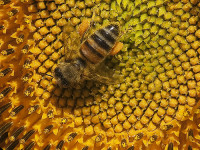Uncertainty Hinders European Report on Neonicotinoid Risk to Bees

A report this week from the European Food Safety Authority has further provoked the debate over neonicotinoid insecticides, including clothianidin, imidacloprid and thiamethoxam seed treatment, which have been blamed at least in part for causing Colony Collapse Disorder in honey bees.
The EFSA, which is the European Union’s chief risk assessment body for food and feed safety, said it identified several risks posed to bees by the pesticides. A caveat was that it was unable to finalize its assessments in some cases due to “shortcomings in the available data.”
Only the use of neonicotinoids on crops not attractive to bees was considered acceptable regarding exposure from pollen and nectar, according to the report. A risk was indicated or could not be excluded from exposure to dust. It pointed to some exceptions on the risk from dust exposure, such as use on sugar beet and crops planted in glasshouses and for the use of some granules.
Regarding exposure from guttation – or the exudation of water from leaves as a result of root pressure – it said the only risk assessment that could be completed was for maize treated with thiamethoxam. Field studies in this case show “an acute effect on honey bees exposed to the substance through guttation fluid.”
The European Crop Protection Association discredited the EFSA report, as the agency acknowledged a “high level of uncertainty” in its evaluations because its risk assessment for bees is still under development.
The reports on neonicotinoid-based pesticides “provide no ground to challenge their current safe use in practice, and is instead limited to potential risks,” said ECPA Director General Friedhelm Schmider.
“Restricting neonicotinoid pesticides on the basis of potential risks will do nothing to improve overall bee health but would do enormous damage to farming and food production in Europe. Let’s focus on the major threats to bee health, such as Varroa mite, diseases and loss of habitat and forage,” Schmider added.
According to a report published this month by the Humboldt Forum for Food and Agriculture – which is supported by industry heavyweights such as Syngenta, Bayer and the European Farmers and European Agri-Cooperatives – neonicotinoid seed treatments are worth $3.2 billion a year in commodity crop revenue, and the loss of the pesticides could lead to a yield decline of up to 20% for winter wheat farmers in the United Kingdom.
Bayer Responds
Monheim, Germany-based Bayer CropScience, the primary producer of imidacloprid, responded by citing the scientific community’s consensus that poor bee health and colony losses are caused by multiple factors, notably the parasitic Varroa mite. Bayer said it is currently evaluating the EFSA report.
“The company is ready to work with the European Commission and Member States in order to take the necessary steps to develop pragmatic solutions to address the perceived data gaps which EFSA consider to be present,” Bayer said, adding:
“We believe it is very important that any political decision relating to registrations of neonicotinoid-containing products, following the publication of the EFSA reports, should be based on clear scientific evidence of adverse effects of the affected products under ‘realistic conditions of use.’”
EFSA’s risk assessments focused on three main routes of exposure: exposure from residues in nectar and pollen in the flowers of treated plants; exposure from dust produced during the sowing of treated seeds or application of granules; and exposure from residues in guttation fluid produced by treated plants.
A number of recent studies have suggested that exposure to neonicotinoids at sub-lethal doses can have negative effects on bee health and bee colonies. No single cause of declining bee numbers has been identified, however.
The Food and Agriculture Organization of the United Nations estimates that 71 of the 100 crop species that provide 90% of food worldwide are pollinated by bees. The majority of crops grown in the EU depend on insect pollination.





